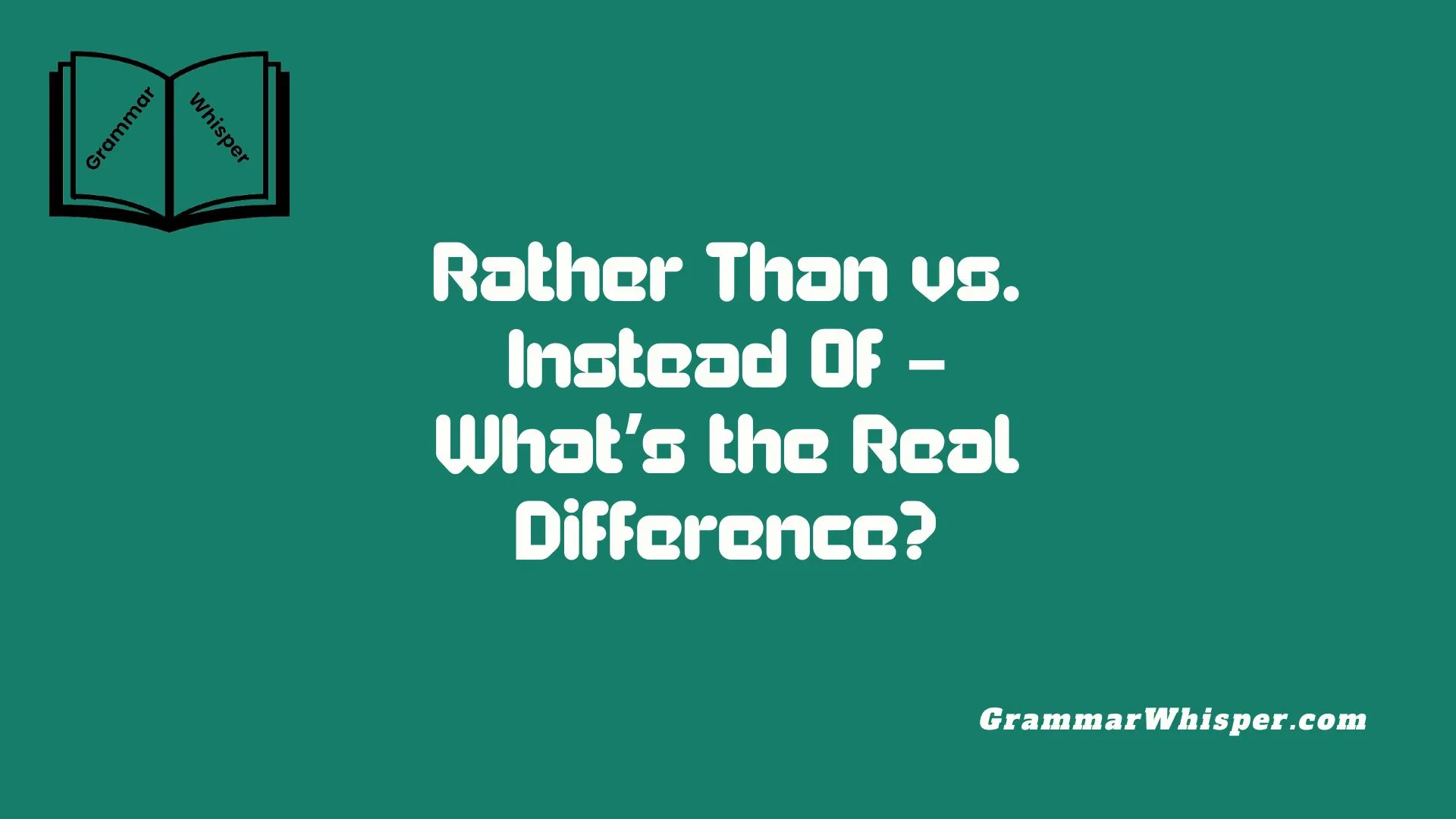When I first started editing academic documents, I watched how fluent speakers naturally used rather than or instead of, sometimes without realizing the impact. But for non-native writers, understanding the difference is everything. The subtle nuances in how we use these phrases can shift tone, change meaning, and deeply affect how communication lands. Especially in professional settings, the usage of the right phrase can enhance clarity or just as easily break it. A polished line doesn’t just follow rules – it flows, and recognizing these distinctions is a major step to mastering the language. Knowing how, when, and why to use each term is not just helpful – it’s crucial.
I often teach this by using real examples with a simple structure that fits the context. It’s through this comprehensive approach that people discover how grammar and natural phrasing connect. A quick guide or quick-reference chart helps, but true understanding comes with consistent practice. If you’re aiming for clarity in a high-stakes presentation or just trying to sound natural in casual writing, it’s about choosing each word wisely. The right phrase delivers high-impact. There are great tools that break down the gap between common phrases, helping you move from guessing to confident, informed choices – no matter the type of content you’re crafting.
Why “Rather Than” vs. “Instead Of” Matters More Than You Think
You might think: Does it even matter which one I use? Actually, yes – because the tone, grammatical structure, and logic behind your sentence change depending on which phrase you choose.
Consider these two sentences:
- “I’d go hiking rather than stay inside all day.”
- “I’d go hiking instead of staying inside all day.”
They seem close – but they don’t sound identical, and they carry a slightly different emotional weight. The first suggests preference. The second leans into substitution.
In formal writing, business proposals, academic texts, or even casual conversations, using the right one can make your meaning sharper, clearer, and more natural.
What “Rather Than” and “Instead Of” Really Mean
Let’s strip these phrases down to their core definitions:
| Phrase | Core Meaning | Function | Common Use |
| Rather Than | Expresses a preference or contrast | Conjunction / Preposition | Used to compare two actions or ideas |
| Instead Of | Indicates a substitution or replacement | Preposition | Used when something replaces another |
“Rather Than”:
- Suggests preference or contrast
- Often connects two actions or ideas
- Can be more stylistically flexible
“Instead Of”:
- Used when one thing is substituted for another
- Feels more direct and final
- Always used as a preposition
Bottom line? “Rather than” is about what you’d prefer. “Instead of” is about what you replace.
Grammar Breakdown: How Each Phrase Works
The grammatical roles of “rather than” and “instead of” are where things get technical – but also where most people get confused. Let’s clarify it all.
“Rather Than” – The Flexible Connector
- Can function as a coordinating conjunction, linking two actions.
- Can also act like a preposition when followed by a noun or gerund.
- Requires parallel structure when connecting similar parts of speech.
✅ Correct: “She jogs rather than walks.” ✅ Correct: “He chose silence rather than argument.”
⛔ Incorrect: “She jogs rather than walking.” (mismatched forms)
“Instead Of” – The Prepositional Workhorse
- Always functions as a preposition
- Must be followed by a noun, pronoun, or gerund
- Cannot connect two clauses like “rather than” can
✅ Correct: “He used tea instead of coffee.” ✅ Correct: “She went running instead of swimming.”
⛔ Incorrect: “He used tea instead of he drank coffee.” (can’t connect full actions)
Tone and Subtext: What Are You Really Saying?
One of the biggest differences between “rather than” and “instead of” lies in tone.
When to Choose “Rather Than”:
- Use it when you want to show preference or soft contrast
- It carries a slightly more elegant or formal tone
- Ideal for balanced comparisons
✦ “I’d rather explain it to you in person rather than over email.”
Here, the speaker is not dismissing the second option entirely – just expressing a preference.
When to Choose “Instead Of”:
- Best for direct substitution
- Tends to sound stronger, firmer, or more decisive
- Ideal for clearly replacing one action or item with another
✦ “He submitted his résumé digitally instead of mailing it.”
The decision has already been made – emailing replaced mailing.
When to Use “Rather Than”: Usage and Examples
“Rather than” is ideal for expressing choice or preference between two actions. It’s especially useful in writing that values nuance, such as essays, editorials, and professional communication.
Sentence Structures:
- Verb + “rather than” + verb (use parallel forms)
- Noun + “rather than” + noun
- Gerund + “rather than” + gerund
Examples:
- “They opted to invest rather than spend.”
- “He prefers tea rather than coffee.”
- “She enjoyed painting rather than drawing.”
Bonus Tip:
When “rather than” connects verbs, the structure must remain parallel:
- ✅ “Cook rather than fry.”
- ⛔ “Cook rather than frying.”
Use it when:
- You’re comparing behaviors
- You want to sound balanced or sophisticated
- You’re expressing thoughtful contrast
When to Use “Instead Of”: Usage and Examples
“Instead of” replaces one thing with another. It’s ideal when the second thing is completely replacing the first.
Sentence Structures:
- “Instead of” + noun
- “Instead of” + gerund
- “Instead of” + pronoun
Examples:
- “He bought an electric car instead of a hybrid.”
- “She went jogging instead of swimming.”
- “Use Google Docs instead of Microsoft Word.”
Bonus Tip:
“Instead of” often emphasizes a clear decision or firm rejection of the second option.
Use it when:
- You’re replacing one object, activity, or choice with another
- The tone should be assertive or decisive
- You want your message to be unambiguous
Context Makes the Difference: Real-Life Examples
Let’s test your instincts. Which feels more natural?
Example 1:
- “I’ll attend the webinar rather than miss it.”
- “I’ll attend the webinar instead of missing it.”
✅ Both are grammatically correct. But the first sounds like a preference, the second a replacement.
Example 2:
- “He ate fruit rather than cake.”
- “He ate fruit instead of cake.”
✅ Both work – but “rather than” sounds more health-conscious or thoughtful, while “instead of” sounds more decisive.
Bottom line: Always ask – Am I contrasting or replacing?
Common Mistakes and How to Avoid Them
Even native speakers sometimes fumble these. Here are the top mistakes and how to fix them:
❌ Mistake 1: Mixing Verb Forms
- Wrong: “She dances rather than singing.”
- ✅ Correct: “She dances rather than sings.”
❌ Mistake 2: Using “Instead Of” to Link Two Verbs
- Wrong: “He emailed instead of he called.”
- ✅ Correct: “He emailed instead of calling.”
❌ Mistake 3: Using Them Interchangeably
- “She used logic rather than facts.” (This implies preference for logic over facts, which could be misleading.)
Always think context, tone, and grammar before picking the phrase.
Business, Academic, and Conversational Use
Let’s see how the choice between “rather than” and “instead of” plays out in different settings.
Business Emails
- “Let’s resolve the issue rather than escalate it.” ✅ Professional, diplomatic
- “Let’s use Zoom instead of Teams for the meeting.” ✅ Clear decision
Academic Writing
- “The study employed qualitative data rather than quantitative metrics.”
- “The author argues in favor of democracy instead of authoritarianism.”
Everyday Speech
- “I’ll cook tonight instead of ordering out.”
- “I’ll relax tonight rather than work late.”
Quick Comparison Table: “Rather Than” vs. “Instead Of”
| Feature | Rather Than | Instead Of |
| Function | Conjunction or Preposition | Preposition only |
| Expresses | Preference, contrast | Substitution, replacement |
| Follows | Verb, gerund, noun, clause | Gerund, noun, pronoun |
| Tone | Softer, more formal | Direct, stronger |
| Sentence Style | More complex or academic | More decisive or conversational |
| Example | “Read rather than watch TV.” | “Read instead of watching TV.” |
Mini Quiz: Test Your Understanding
Choose the correct phrase for each sentence.
- He chose to walk _______ take a taxi.
- ✅ rather than
- We used a reusable bottle _______ buying plastic.
- ✅ instead of
- She worked late _______ leaving early.
- ✅ rather than
- Try meditation _______ medication.
- ✅ instead of
Final Thoughts
Understanding the difference between “rather than” and “instead of” is more than just a grammar exercise – it’s about improving clarity, tone, and effectiveness in your communication. While both phrases may seem interchangeable at a glance, they serve different purposes. “Rather than” often highlights preference or contrast between actions, while “instead of” points to a clear substitution or replacement.
Choosing the right phrase helps you convey your message more accurately. In business writing, emails, academic papers, or everyday speech, using “rather than” implies a thoughtful decision or comparison. On the other hand, “instead of” suggests you’ve made a firm, decisive choice. The difference may seem subtle, but it often changes how your audience understands your message.
Keep in mind the grammatical structure too. “Rather than” can act as a conjunction or preposition, connecting clauses or parallel ideas. “Instead of” is a preposition and must be followed by a noun or gerund. Paying attention to these details can help you avoid common mistakes and write with more confidence.
In short, these phrases aren’t just grammatical choices – they reflect how you think, speak, and decide. The better you understand them, the more naturally and powerfully you can express yourself.
What is the difference between “rather than” and “instead of”?
“Rather than” expresses preference or contrast, while “instead of” indicates a substitution or replacement. They may seem similar but have different tones and grammatical uses in English sentences.
Can you use “rather than” and “instead of” interchangeably?
Not always. While both can compare or contrast options, “rather than” works better for expressing preferences between actions, and “instead of” fits when replacing one thing with another.
Which is more formal: “rather than” or “instead of”?
“Rather than” tends to be more formal and appropriate for professional or academic writing. “Instead of” sounds more casual and direct, often used in everyday conversation and informal writing.
Do “rather than” and “instead of” follow the same grammar rules?
No. “Rather than” may act as a conjunction or preposition and supports parallel sentence structure. “Instead of” is only a preposition and must be followed by a noun, pronoun, or gerund.
When should I use “rather than” in a sentence?
Use “rather than” when showing preference between two actions or choices, especially when you want to maintain a more balanced, formal, or polite tone in your writing or speech.











